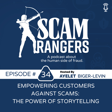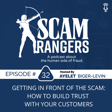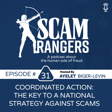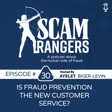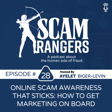
Targeted by Design: The Dark Side of Online Advertising, A Conversation With Sarah Ralston, The Media Trust and Proxyware
In this powerful episode of Scam Rangers, host Ayelet Biger-Levin speaks with Sarah Ralston, online safety expert, fraud investigator, and mother of five, about the hidden dangers lurking in online ads.
We dive deep into how scam ads are hyper-targeted using the same ad tech that powers legitimate marketing, exploiting trust, grief, and even childhood curiosity. From cloaking techniques that evade detection to the heartbreaking targeting of seniors on obituary pages and kids in school, Sarah uncovers the shocking truths behind today’s online ecosystem.
We discuss:
- The psychological manipulation baked into scam ads
- Why 20% of programmatic ads may be scams
- How bad actors use ad tech better than most marketers
- Cloaking and how it defeats traditional ad review systems
- Real-world stories of targeted exploitation—including children and grieving seniors
- What businesses, schools, and governments can do now
- Where hope lies: data sharing, regulation, and collaboration
If you’ve ever wondered how safe your online experience really is—or how to protect others—this episode is a must-listen.
Sarah Ralston: https://www.linkedin.com/in/sarah-ralston-businessops/
Additional Resources:
- Google Ads Safety Report 2024
- Israeli Internet Association: Algorithmic Scams Report
- Tech Support Scams GASA Webinar August 20, 2025
Subscribe to Scam Rangers for more behind-the-scenes looks at the human side of scams—and the people fighting back.
This podcast is hosted by Ayelet Biger-Levin, who has spent the last 15 years building technology to help financial institutions authenticate their customers and identify fraud. She believes that when it comes to scams, the story starts well before the transaction. Ayelet created this podcast to talk about the human side of scams and to learn from those dedicated to advocating for scam victims and taking action against fraud. Be sure to follow Ayelet on LinkedIn: https://www.linkedin.com/in/ayelet-biger-levin/
More from RangersAI: https://www.linkedin.com/company/rangersai/ Learn More: https://www.rangersai.com/











